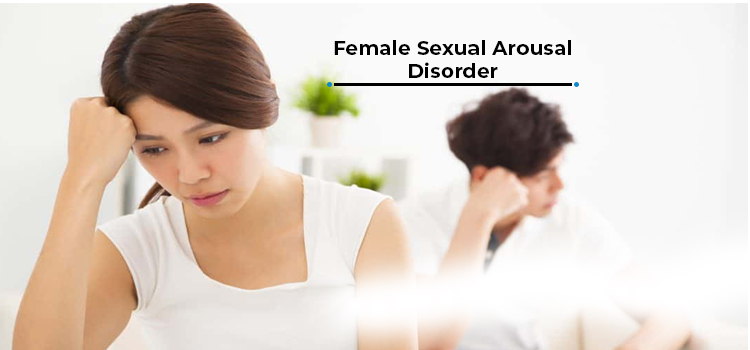Female Sexual Arousal Disorder (FSAD) is a condition that affects women’s ability to become sexually aroused and experience pleasure during sexual activities. It is important to note that sexual arousal disorders can have both physical and psychological causes. FSAD can significantly impact a woman’s sexual satisfaction and overall well-being.
What are the symptoms?
The symptoms of Female Sexual Arousal Disorder (FSAD) can vary from woman to woman. Here are some common symptoms associated with FSAD:
Decreased Sexual Desire: One of the primary symptoms of FSAD is a persistent or recurrent lack of sexual desire. Women with FSAD may experience a diminished interest in sexual activities and may not initiate or respond to sexual advances.
Absence or Insufficient Arousal: Women with FSAD may struggle to attain or maintain the necessary physical and mental arousal for engaging in sexual activities. This may include a lack of genital lubrication, reduced genital sensation, or difficulties in achieving and sustaining arousal.
Limited Sexual Sensations: Women with FSAD may experience reduced or altered sensations during sexual stimulation. They may find it challenging to experience pleasurable sensations, making it difficult to achieve orgasm or derive satisfaction from sexual encounters.
Emotional Distress and Relationship Strain: Living with FSAD can lead to emotional distress, low self-esteem, and relationship challenges. The frustration, guilt, and shame associated with FSAD can affect a woman’s overall well-being and intimate connections.
Impact on Daily Life: FSAD can extend beyond the bedroom and affect various aspects of a woman’s life. It may lead to reduced sexual confidence, avoidance of intimacy, and a negative impact on overall self-esteem and quality of life.
Seeking Solutions:
If you identify with these symptoms, it is essential to seek professional help. Consulting with a healthcare provider, such as a gynecologist or sexual health specialist, can lead to an accurate diagnosis and effective treatment options.
Treatment approaches may include:
Psychotherapy: Individual or couples therapy can help address emotional barriers, improve communication, and address any underlying psychological factors contributing to FSAD.
Hormone Therapy: In some cases, hormonal imbalances may contribute to FSAD. Hormone replacement therapy or other hormonal interventions may be recommended to restore balance.
Medications: Certain medications, such as topical creams or oral medications, may be prescribed to enhance sexual arousal and improve blood flow to the genital area.
Lifestyle Changes: Adopting a healthy lifestyle, including regular exercise, stress management techniques, and maintaining a balanced diet, can positively impact sexual health.
Causes of Female sexual arousal disorder:
Female Sexual Arousal Disorder (FSAD) can have various underlying causes, which can be physical, psychological, or a combination of both. Understanding the potential causes is important for proper diagnosis and treatment. Here are Some common factors that can contribute to FSAD:
Hormonal Imbalances: Fluctuations or imbalances in hormones, such as estrogen and testosterone, can affect sexual arousal in women. Hormonal changes during menopause, postpartum period, or certain medical conditions can impact sexual functioning.
Psychological Factors: Psychological factors play a significant role in sexual arousal. Stress, anxiety, depression, past traumatic experiences, relationship issues, body image concerns, and low self-esteem can all contribute to FSAD.
Medical Conditions: Certain medical conditions can interfere with sexual arousal. These may include diabetes, cardiovascular disease, neurological disorders, hormonal disorders (e.g., polycystic ovary syndrome), chronic pain conditions, and autoimmune disorders.
Medications: Some medications, such as antidepressants, antihistamines, blood pressure medications, and certain contraceptives, can have side effects that affect sexual arousal.
Substance Abuse: Excessive alcohol consumption, recreational drug use, or substance abuse can impair sexual arousal and functioning.
Lack of Sexual Stimulation: Insufficient sexual stimulation, lack of sexual education, or inadequate knowledge about one’s own body and sexual preferences can contribute to FSAD.
Relationship Issues: Difficulties within a relationship, communication problems, unresolved conflicts, or lack of emotional intimacy can impact sexual arousal.
Sociocultural Factors: Cultural or societal beliefs, values, and attitudes towards sexuality can influence a woman’s sexual arousal. Sociocultural factors may create inhibitions, shame, or guilt around sexual expression.
How to treated Female sexual arousal disorder
The treatment of Female Sexual Arousal Disorder (FSAD) typically involves a comprehensive approach that addresses both the psychological and physiological aspects of the condition. Here are some common treatment options:
Psychotherapy: Individual or couples therapy can be beneficial for addressing any underlying psychological factors contributing to FSAD. Therapy can help improve communication, enhance sexual self-esteem, address relationship issues, and develop coping strategies for managing stress and anxiety related to sexual experiences.
Hormone Therapy: In cases where hormonal imbalances are identified as a contributing factor, hormone replacement therapy or other hormonal interventions may be recommended. These treatments can help restore hormonal balance, improve vaginal lubrication, and enhance sexual arousal.
Medications: Certain medications, such as topical creams or oral medications, may be prescribed to enhance sexual arousal, increase blood flow to the genital area, or improve lubrication. These medications can help improve sexual response and alleviate specific symptoms of FSAD.
Pelvic Floor Exercises: Strengthening the pelvic floor muscles through exercises, such as Kegels, can improve blood flow to the genital area and enhance sexual arousal. Working with a pelvic floor physical therapist can provide guidance on specific exercises to target the pelvic floor muscles effectively.
Lifestyle Modifications: Adopting a healthy lifestyle can positively impact sexual health. This includes regular exercise, managing stress levels, maintaining a balanced diet, and avoiding habits that can negatively affect sexual function, such as smoking or excessive alcohol consumption.
Sensate Focus Exercises: Sensate focus exercises involve non-sexual touching and exploration of the body to increase body awareness, build intimacy, and enhance sexual arousal. These exercises can be done individually or with a partner under the guidance of a therapist.
Couple’s Counseling: If FSAD is causing relationship strain, couple’s counseling can be beneficial. This can help address communication issues, improve emotional intimacy, and foster a supportive and understanding sexual relationship.
The Bottom line
Many women encounter some form of sexual dysfunction at some point, including difficulties with arousal. While experiencing Female Sexual Arousal Disorder (FSIAD) can be isolating and frustrating, it is highly treatable. Begin by scheduling an appointment with your healthcare provider to rule out any underlying physical or psychological factors contributing to your symptoms. Additionally, consider seeking guidance from a sex therapist, either individually or with your partner. You can purchase best buy generic pills female viagra online easily


